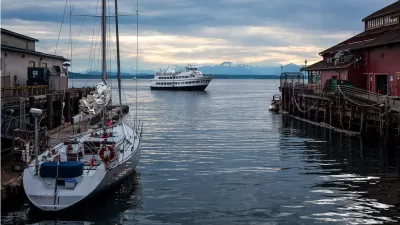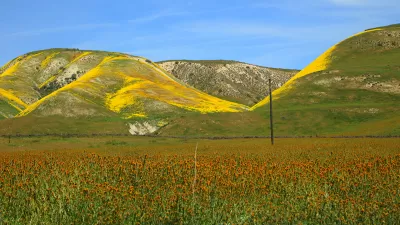The state's unique Clean Air Rule is called 'cap-and-reduce.' Businesses that fall under the cap are required to reduce emissions, just like California's cap-and-trade program. However, they can not be forced to purchase carbon credits.
"Under the new rule, businesses that are responsible for 100,000 metric tons of carbon pollution annually will be required to cap and then gradually reduce their emissions," according to the Department of Ecology, Washington's environmental protection agency.
If a business cannot limit its own emissions, it has other options. It could develop a project that reduces carbon pollution in Washington, such as an energy efficiency program. Businesses could also comply by buying carbon credits from others or from other approved carbon markets.
The plan relies on businesses to trade independently among themselves and with other markets. All emissions reductions, projects and trading would be validated by independent auditors with oversight from Ecology.
In California's cap-and-trade program [PDF], which held its first auction in November 2012, emitters are now required to purchase carbon allowances or offsets at quarterly auctions if necessary, unlike large emitters in Washington come Oct. 17, when the program starts. However, the future of the California program is very uncertain.
Initially the Clean Air Plan will "apply to 24 businesses that each produce at least 100,000 metric tons of carbon each year, including all five oil refineries in Washington, as well as power plants, fuel distributors and other industries," reports Samantha Larson, the science correspondent for Crosscut, the Pacific Northwest’s reader-supported, independent, non-profit electronic journal. "Collectively, they account for two-thirds of all the carbon pollution produced in the state."
A California-style cap-and-trade program as Gov. Jay Inslee's (D) original preference in 2014 with revenues used to fund a comprehensive statewide transportation program and schools. The carbon charge would have been 'the equivalent of the amount of revenue generated by a 12 cent gas tax increase, without the tax'," per Planetizen. As it turned out, Inslee got an 11.9-cent gas tax increase and a carbon cap.
“In short, the Clean Air Rule sets up a cap on carbon pollution in Washington and slowly reduces that cap over time,” Ecology Director Maia Bellon explained at a press conference held on the Seattle waterfront Thursday afternoon.
The measure, which operates under the state’s Clean Air Act, will require the targeted businesses to reduce their carbon emissions by an average of 1.7 percent each year.
After Inslee's initial attempt at carbon pricing failed, he directed Bellon to come up with a rule, which was launched in September 2015, reported John Stang for Crosscut.
There are "penalties for non-compliance," reports Bellamy Pailthorp environmental reporter for Seattle's KNKX Public Radio News.
Credits could also be earned through projects that reduce emissions, such as a digester at a dairy farm that converts methane from manure into energy instead of releasing it into the atmosphere.
A coalition of environmental groups issued a joint statement calling it an important first step and emphasizing the need for even more action to ensure that Washington meets its sustainability goals.
However, in July a small group of environmentalists engaged in a fast on the capitol steps as part of a protest against Gov. Jay Inslee's Clean Air Rule because they felt "the proposed rule doesn't go far enough," reported KNKX.
How the new rule, opposed by many Republican legislators and businesses, plays into the campaigns for and against the November revenue-neutral carbon tax measure, I-732, will be interesting to watch.
Also see:
- AP via The Seattle Times: State limits carbon pollution from large sources, Sept. 15
- Department of Ecology: Limiting carbon pollution through the Washington Clean Air Rule
From Planetizen:
- Gas Tax vs. Carbon Charge Debate Looms in Washington State, February 4, 2015
- Washington Governor Proposes Cap-and-Trade to Fund Highways, December 21, 2014
FULL STORY: State unveils new rules to combat climate change

Planetizen Federal Action Tracker
A weekly monitor of how Trump’s orders and actions are impacting planners and planning in America.

Map: Where Senate Republicans Want to Sell Your Public Lands
For public land advocates, the Senate Republicans’ proposal to sell millions of acres of public land in the West is “the biggest fight of their careers.”

Restaurant Patios Were a Pandemic Win — Why Were They so Hard to Keep?
Social distancing requirements and changes in travel patterns prompted cities to pilot new uses for street and sidewalk space. Then it got complicated.

Platform Pilsner: Vancouver Transit Agency Releases... a Beer?
TransLink will receive a portion of every sale of the four-pack.

Toronto Weighs Cheaper Transit, Parking Hikes for Major Events
Special event rates would take effect during large festivals, sports games and concerts to ‘discourage driving, manage congestion and free up space for transit.”

Berlin to Consider Car-Free Zone Larger Than Manhattan
The area bound by the 22-mile Ringbahn would still allow 12 uses of a private automobile per year per person, and several other exemptions.
Urban Design for Planners 1: Software Tools
This six-course series explores essential urban design concepts using open source software and equips planners with the tools they need to participate fully in the urban design process.
Planning for Universal Design
Learn the tools for implementing Universal Design in planning regulations.
Heyer Gruel & Associates PA
JM Goldson LLC
Custer County Colorado
City of Camden Redevelopment Agency
City of Astoria
Transportation Research & Education Center (TREC) at Portland State University
Camden Redevelopment Agency
City of Claremont
Municipality of Princeton (NJ)





























